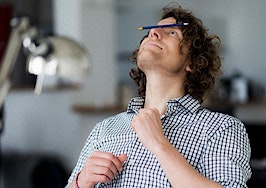Welcome to our new recurring column about all things personal and business finance for agents and brokers. Each column will host a new contributing writer who will share the financial savvy they’ve learned in their career.
When it comes to the financial health of real estate agents, there are some definite rules to follow so you don’t end up playing catch-up for years to come.
Organization is key. If you don’t have a plan for your finances, create one now. Our business is enough of an emotional rollercoaster to begin with. Why add another reason to pull your hair out when you can avoid it with a few basic rules?
Keeping a journal about how much money is coming in as well as how much goes out is essential. Knowing your spending habits will help guide you in creating a budget for yourself. Remember, YOU are the business and ALL businesses keep ledgers so they know when to cut back.
My first rule is primarily for new sales agents. However, all agents can benefit from it.
Build a reserve
You should always have a larger emergency reserve than a salaried individual. Before starting your real estate career, you should pay down as much debt as possible or eliminate all debt completely. You should also plan on not making any income for 60-90 days, at a minimum, while you are working 40-60 hours a week (no weekends off) with buyers and sellers.
My recommendation is that an agent has at least a 12-month reserve which would cover all bills for the coming year. By having this reserve, you can comfortably pay your bills while you concentrate on working hard to make those deals. Even if you end up having an accepted offer on your first day of work, you may not see that commission check for months to come. Reserve now or regret it later.
Pay your taxes
My second rule applies to almost every agent. Pay your taxes on time. In other words, as soon as you receive the cash, put the tax money away. I cannot stress how important this is for agents to do this. We are independent contractors. No one is taking the tax or FICA or any other expenses from our checks. It’s up to us to do it, and do it we must.
Many real estate agents know you can easily be seduced by that $25,000 commission check that lands in your hands. “Wow, I’ve got $25,000 to spend. What closing gift should I get myself?” What many of us seem to forget is, @ 30% +/- of that needs to be used to pay our taxes. If you put that off, let’s say twice (on two $25,000 commission checks), you will now be @ $15,000 behind in tax payments. If you don’t have a big deal ready to close in the near future, you can, and will, end up in tax hell.
Let’s say you do have that deal closing in the near future. One never knows what that future might bring. Who hasn’t been burned at the last minute because of a co-op board turndown, or a buyer being turned down for the mortgage AFTER the board approval has been issued? If the buyer had a financing contingency for that mortgage, that deal is will now dead (as is the commission you were counting on.)
The deal is not over till the ink is dry. You’ve received your commission and the cash is in the bank. Don’t spend money YOU THINK you will be receiving from a deal, just because that closing is two weeks away.
In the words of Yankee great, Yogi Berra…”It ain’t over, till it’s over”
Now, with that deal you thought would be closing but now is dead, welcome back to square one. If you weren’t smart, you have now spent all the money from your last deal when it should have gone to pay your taxes. Owing taxes and not having a new deal insight to close is a terrible predicament to be in.
I classify that scenario as “in the hole.” Start digging, my friend … and do it fast.
Nothing is foolproof when it comes to balancing your finances while working as a real estate agent. There is, however, a simple solution to try and help you avoid tax hell. You have to be diligent and you must stick to it, otherwise, it doesn’t work and you’ll be back to where you started.
Google “Tax Payment Voucher” and the current year, print out the voucher and make at least two dozen copies. Keep half of the printed vouchers at home and half of them at the office. Along with the vouchers, prepare two dozen envelopes that are pre-addressed, stamped and made out to the IRS. As soon as you get a commission check or a direct deposit, make out a check(s) for that 30% tax and send it off to Uncle Sam immediately.
By doing this, you will keep yourself up-to-date with taxes and never have to worry about having to pay a huge amount to the government come April 15th. There is no better feeling than writing that check, knowing you can actually save or spend what you have left in the bank (save is the better option) and not have to worry about doing “just one more deal” three months before taxes are due so you can pay the tax owed for last year.
If you don’t do this, you will be playing catch-up for years to come.
Save for the future
My third and final rule is saving for the future. There are many different retirement savings plans you can choose from. Choose what’s right for you, but just do it. Always keep in mind that we work for ourselves. We don’t work for a company that takes a certain amount out of our checks for taxes and a certain amount out for our 401K. We need to do this, all of this, ourselves.
So, after you have immediately paid that 30 percent tax from your check, you now have to think about how much to save for the future. Sitting down with your financial planner to figure this out is a good way to start. Side note: speak to your colleagues for financial planner recommendations. Get referrals and talk to more than one.
When you take the time to speak with the financial planners, interview them like you would anyone else that you were paying for a service. On a basic level when receiving your commission, send 30 percent to the IRS and put 30 percent into savings/retirement. Of course, you will adjust those numbers according to your lifestyle, family needs, etc. If you do follow this structure, that will leave you 40 percent to live on.
My advice is to always base your living expenses on 40 percent of your gross income, no matter how much cash is flowing in. At some point, you will end up in a “dry spell” and you never know when it will start raining deals again. For some agents, those percentages may not be realistic but that is why you have to have a financial planner. It’s all up to you.
You wanted to be an independent contractor so you could control your hours, the number of days at the office and your lifestyle. Now it’s time to control your finances. Once you are in control, your financial freedom will only make you feel more confident. Along with that confidence will come more deal-making, and isn’t that what it’s all about?
Do you want to share your financial insight with the community? Reach out to us to contribute your own “Dollars and Sense” column.
Bill Kowalczuk is a top residential broker with over 20 years of industry experience with Warburg Realty.













